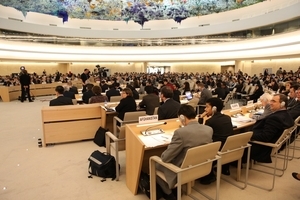A top U.N. official visiting Sri Lanka warned today that Sri Lanka is facing “what amounts to two quite distinct crises.” The first is the one I’ve been writing about on this blog: the tens of thousands of civilians trapped in the small area of northeastern Sri Lanka still controlled by the opposition Tamil Tigers. With fighting continuing between the Sri Lankan government and the Tigers, those civilians are in grave danger of death or injury. My concern for their safety only increased after a Sri Lankan army commander told reporters today, “Now, the tigers are fighting out of uniforms, and it’s hard to distinguish between tigers and civilians. This forced us to slow down offensives for fear of causing harm to civilians.” Won’t a slower offensive still cause civilian casualties, since it’s so hard to distinguish who’s a civilian and who isn’t?
The second humanitarian crisis is the one faced by the civilians who’ve been able to flee the war zone. The U.N. has reported that more than 100,000 have gotten out over the past week. Such a large number in such a short time understandably strains resources. But the Sri Lankan government hasn’t helped matters; as AI has reported, the government requires fleeing civilians to stay in camps which they’re restricted from leaving. Some of the camps are severely overcrowded, with some people being forced to stay out in the open with no shelter. Other are placed in tents designed for a family of five but which are holding an average of 18 people and with limited water supplies. UNICEF said yesterday that many people arriving at the camps are exhausted, malnourished and often wounded or sick. UN agencies are airlifting emergency supplies to the north of the country where the camps for the displaced civilians are located.
Civilians who’ve fled the war zone don’t just face the danger of overcrowded camps with inadequate supplies. UNHCR said today that they’ve gotten reports of physical assaults on men and women fleeing the zone. AI has reported that some men fleeing the conflict area have disappeared after being detained by the Sri Lankan security forces. While the Sri Lankan government should protect fleeing civilians from any Tiger members who may be mixed in with them, the government needs to carry out a screening process that protects the rights of both the civilians as well as the suspected Tiger fighters.
Both crises need immediate solutions. For the first, the government and the Tigers should let the trapped civilians leave the war zone now. For the second, the government should respect the human rights of those fleeing, both during the screening process and in the camps in which they’re housed.
